Reducing Rejection in Pediatric Kidney Transplantation: The Improving Renal Outcomes Collaborative (iroc)
1Cincinnati Children's Hospital Medical Center, Cincinnati, OH, 2Phoenix Children’s Hospital, University of Arizona, Phoenix, AZ, 3SSM Health Cardinal Glennon Children's Hospital, St Louis, MO, 4University of Iowa Stead Family Children’s Hospital, Iowa City, IA, 5C.S. Mott Children’s Hospital, Ann Arbor, MI, 6Johns Hopkins University School of Medicine, Baltimore, MD, 7Arkansas Children’s Hospital, Little Rock, AR, 8University of Alabama at Birmingham, Children’s of Alabama, Birmingham, AL, 9Cohen Children's Hospital, Brooklyn, NY, 10Levine Children's Hospital, Charlotte, NC
Meeting: 2021 American Transplant Congress
Abstract number: 235
Keywords: Immunosuppression, Pediatric, Rejection
Topic: Clinical Science » Kidney » Kidney: Acute Cellular Rejection
Session Information
Session Name: Kidney: Acute Cellular Rejection
Session Type: Rapid Fire Oral Abstract
Date: Monday, June 7, 2021
Session Time: 4:30pm-5:30pm
 Presentation Time: 4:40pm-4:45pm
Presentation Time: 4:40pm-4:45pm
Location: Virtual
*Purpose: To study the effect of implementing a Medication Adherence Promotion System (MAPS) on acute rejection (AR) rates in 9 pediatric kidney transplant (KT) programs.
*Methods: Time series analysis of AR and biopsy rates across 9 IROC centers who have begun clinical implementation of MAPS: a bundle of evidence-based strategies to identify patients at risk for rejection and address patient/caregiver identified immunosuppression adherence barriers. AR and biopsy rates for all pts > 1-yr post-KT (n=558, 64% male, median age 15y) were analyzed from 1/2018 through 10/2020 using statistical process control u-charts. Centerline and 3 standard deviation control limits were calculated from baseline data and adjusted when special cause was met according to established standards. Charts were annotated with the date each center started bundle interventions.
*Results: 130/266 (49%) pts identified at least 1 adherence barrier – most commonly: forgetting to take the medication, hate the taste, and side effects. Baseline rejection rate in the nine centers was 0.94 per 100 patient months, special cause was first noted 8/2019 – the rejection rate decreased to 0.53 rejections per 100 patient months. Baseline biopsy rate in the centers was 6.39 biopsies per 100 patient months, special cause was first noted 8/2019 – the biopsy rate decreased to 3.03 biopsies per 100 patient months. Whereas rejection and biopsy rates both decreased by about 50%, there was no change in the percentage of biopsies with rejection, suggesting the decrease in rejection rate was not due to ascertainment bias (i.e. simply performing less biopsies).
*Conclusions: The spread of a clinical system to identify and address adherence barriers across diverse clinical settings is preliminarily associated with decreased rates of acute rejection and biopsies.
To cite this abstract in AMA style:
Varnell C, Warmin A, Barletta G, Belsha C, Harshman L, Kershaw D, Pruette C, Ranabothu S, Seifert M, Singer P, Yanik M, Rich K, Modi A, Hooper D. Reducing Rejection in Pediatric Kidney Transplantation: The Improving Renal Outcomes Collaborative (iroc) [abstract]. Am J Transplant. 2021; 21 (suppl 3). https://atcmeetingabstracts.com/abstract/reducing-rejection-in-pediatric-kidney-transplantation-the-improving-renal-outcomes-collaborative-iroc/. Accessed February 20, 2026.« Back to 2021 American Transplant Congress

